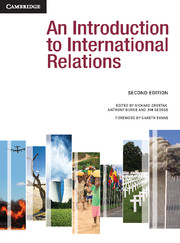Book contents
- Frontmatter
- Contents
- Tables, Figures and Boxes
- Contributors
- Preface and acknowledgements
- An Introduction to International Relations: The origins and changing agendas of a discipline
- 1 Theories of International Relations
- 1 International Relations Theory in an Age of Critical Diversity
- 2 Realism
- 3 Liberalism
- 4 Marxism and Critical Theory
- 5 Feminism
- 6 Postmodernism
- 7 Constructivism
- 8 Theories of Global Justice
- 2 The Traditional Agenda
- 3 The New Agenda
- Glossary of Terms
- Bibliography
- Index
- References
5 - Feminism
from 1 - Theories of International Relations
- Frontmatter
- Contents
- Tables, Figures and Boxes
- Contributors
- Preface and acknowledgements
- An Introduction to International Relations: The origins and changing agendas of a discipline
- 1 Theories of International Relations
- 1 International Relations Theory in an Age of Critical Diversity
- 2 Realism
- 3 Liberalism
- 4 Marxism and Critical Theory
- 5 Feminism
- 6 Postmodernism
- 7 Constructivism
- 8 Theories of Global Justice
- 2 The Traditional Agenda
- 3 The New Agenda
- Glossary of Terms
- Bibliography
- Index
- References
Summary
Introduction
This chapter examines different feminist approaches to the study and practice of international relations. It highlights the similarities between these approaches, but also the differences. It does this first by tracing the interventions made by feminists into international relations and the creation of a distinctly feminist agenda. Second, it uses the ‘gender lens’ to demonstrate and analyse how experiences and understandings in international relations can be ‘gendered’. Finally, it explains and criticises the different feminist approaches to international relations.
International relations meets feminism
With evidence of continued inequality between women and men in key areas of international politics, the goal of feminist IR is to highlight, understand and address this inequality, and to encourage the discipline to recognise the importance of gender politics. Consequently, like international relations generally, feminist IR is a broad and diverse field of study. It is a field rich with debate, controversy, cutting-edge research and challenging new methodological approaches. Feminist IR scholars are often necessarily interdisciplinary, synthesising international relations with gender, cultural, post-colonial, environmental and other studies while also drawing heavily from more traditional disciplines. Feminist scholars have made important contributions to international relations theory, security studies, international political economy, development studies, international law and questions of global governance, among other fields.
- Type
- Chapter
- Information
- An Introduction to International Relations , pp. 76 - 90Publisher: Cambridge University PressPrint publication year: 2011

